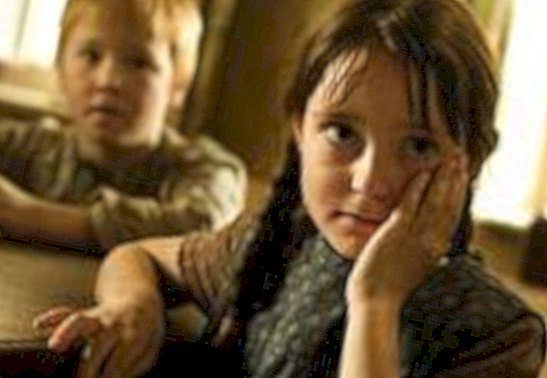Predicate worth seeing: A "devil roast" prevails


The little Hildegard (Nina Siebertz) has eaten something again
© WDR / Thomas KostLittle Hildegard is somehow different: She talks with an old handbag and wants a "Negro doll", which she calls "Fritzchen" - for her idiosyncrasies she regularly gets beatings from the helpless parents. While the others are sleeping, Hilde secretly prays for "the Fritzchen knows", and it is almost as if she prayed for better fit into the family itself.
"Teufelsbraten", the film version of Ulla Hahn's hit novel "The Hidden Word", describes the liberation of a fanciful and inquisitive girl from the narrowness of an arch-Catholic working-class family. The novel, which almost autobiographically describes the struggle of the poor-born author for an apprenticeship, is strangely contemporary, although he plays in the Rhineland of the fifties. The focus is on the protagonist Hildegard Palm, a girl who looks very lost in the provincial Mief of the village somewhere between Cologne and Dusseldorf. We accompany Hildegard from her childhood to Backfischalter.
Somewhat unfamiliar is the Rhenish dialect, in which all characters speak. But at the latest since Marcus Rosenmüller's films in Bavarian dialect, it seems to be a trend to turn more and more German films into dialect. After a few minutes you got used to the dialect of Cologne.
The superstitious grandmother (wonderfully gnarly: Barbara Nüsse) sees in Hildegard a "Düvelsbrode" - a devil's roast - and constantly prays to "Heiljen mother Jottes" when the child has done something again. She raves about Adenauer and scolds the Communists. The relationship that Hilde has with her grandfather (Peter Franke), who seems to be her ally and is the only one who has the same misunderstanding as his granddaughter, is touching.
The older Hildegard becomes, the less she seems to fit into the simple world of her family. This process is described as very painful: Whether she recites the prayer of prayer as the only in High German or penetrates to eat with a knife and fork - it is always verbally or physically beaten for them. Once the father (emphatically embittered: Ulrich Noethen) screams in her face: "Do what you want, you stay wat de - date child of a prostitute!" The grandmother replied indignantly: "I'm not a prostitute, I'm a Catholic!" - Such sentences sit and there is a lot in the film.
Already Ulla Hahn had met the people in her novel "jaws on the mouth" and met exactly the tone of the Rhenish people beat. In it the film is in no way inferior.

Hildegard (Anna Fischer) is determined: she really wants to go to high school
© WDR / Thomas KostThe performers are excellently selected down to the supporting roles and result in a harmonious ensemble. The brief appearance of Harald Schmidt as a sticky laundry representative remains a forgivable exception. Ulrich Noethen mimics the helpless and ultimately heartbroken father with intense intensity. Even the mother, played by Margarita Broich, is convincing: a simple cleaning lady, who watched the development of her daughter with astonishment.
Although it always hurts to say goodbye to a Hildegard actress (there are a total of three), but quickly, the successor draws the viewer back into the story. Especially the play find Anna Fischer in the memory, which portrays Hildegard in the later years remains. With soulful looks from dark eyes and her unruly way, she conquers the heart of the spectator by storm.
Hildegard calls herself Hilla, raves about Schiller and her German teacher. Her friends are all from "better" backgrounds: children of the industrialists for whom the father works. This contrast becomes visual when the friends in the chic Corvette rush past their father on the broken bike.
When the middle school is over, Hilla is sent to work in the factory. There she is ordered around by the secretary secretary Mrs. Wachtel (Corinna Harfouch) and eagerly eavesdropped on her love life. The pointed verbal duels between clever Hilla and the chain-smoking governess are pure pleasure and a show of great acting. The way to the longed-for high school is for Hilla, however, still far and painful.
The North German director Hermine Huntgeburth has staged the novel by Ulla Hahn with sensitivity and an eye for detail. The viewer is completely immersed in Hildegard's world. This sometimes hurts, for example when the deep gulf between the helpless love of the parents and the desperate ambitions of the daughter becomes apparent.But in most cases it is beautiful, because in the sepia-colored pictures the magic of childhood is captured.
"Devil's Roast" is a well-watched environment study - a film that conveys the German post-war atmosphere authentically and tells the story of the development of a strong personality. Our recommendation: Be sure to take a look!
broadcast dates
ARD, March 12th, 8:15 pm (part 1) and March 13th, 8:15 pm (part 2)










